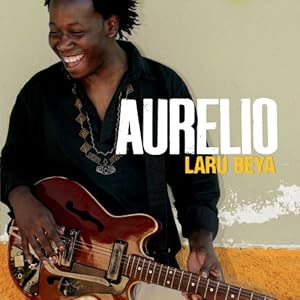
One of my favorite releases of this year so far is Laru Beya by Aurelio Martinez. Aurelio is from Honduras and a member of the Garifuna culture. The journey through 12 songs of a totally different style of music than what I regularly listen to (though still highly accessible) has been one absolutely worth taking, and I encourage all you reading who might be looking for something to expand your horizons to check it out. It is a rich listening experience and a beautiful album.
Whatever the medium, I think it is always good to have some exposure to international works. I admit that I do not always push myself to do this for music (I do better with film and literature), but it has been rewarding just about every time I do. There are numerous reasons why, but for me personally, I enjoy the chance to gain a different and new perspective and I also think it is fun to immerse yourself in another world different from your own, almost like mental traveling. Hearing something foreign can be evocative in ways the familiar is not or cannot be. And it is always interesting to trace influences and common threads, to see how things may be distinctive or tied and also to gain a greater appreciation of the universal human experience.
Laru Beya was released in the United States by Next Ambiance, an imprint of Sub Pop records. Aurelio's album is only their second release, but I am sure they will continue to be worth following. The intent seems to be to act as curator of great world music to bring it to a new audience. Besides putting the music out, they have done an absolutely fantastic job providing contextual details on the Garifuna culture, the recording process and musicians, and the stories of each song in the album's packaging. I would go as far as recommending you buy this album for the liner notes alone! They are incredibly insightful and bring such depth to the listening experience. Just about everything I share here will come from what they wrote, by the way
In a great episode of Seinfeld (The Raincoats), George Costanza described paella as "A spanish dish. It's a melange of fish and meat with rice. Very tasty." You could describe Laru Beya and Garifuna culture in a similar fashion: a foreign melange of elements that come together into a delectable whole. The Garifuna derived from West Africans who crashed on the Caribbean island of Saint Vincent and intermingled with the indigenous Callinago. They were eventually displaced to Central America, becoming a diaspora ranging from Belize to Nicaragua (told in the song "Yurumei"). Their unique heritage emerged from the confluence of geographies, tribes, religions, and more. Their musical tradition – which I am by no means an expert on – centers upon distinctive rhythms, both traditional and sacred. On this album, Aurelio takes these hallmarks of Garifuna music and puts his own spin on things by incorporating bits of other genres like reggae, calypso, ska, and hip-hop, and collaborating with other prominent world musicians (Youssou N'Dour, Orchestra Baobab) to cook up a wonderful aural paella.
One of the things I found most enjoyable about this album was learning about the recording process and using that as a framework for listening. In a small fishing village in Honduras, Aurelio was joined by several dozen musicians in a beachfront house. Laru Beya clearly conveys this communal spirit. The songs are richly textured, a tapestry of Aurelio's guitar with multiple percussion instruments and layers of choral harmony. And the sense of place comes through too. Listen to the song above, the title track, and try to tell me it doesn't transport you to the seaside. This one is a definite must for all summer playlists, it is literally about the joy of young romance on the beach! The song embodies something very cool about art: it is music of a special culture, in languages (vocally and instrumentally) almost certainly unfamiliar to the bulk of Western listeners, yet it has a certain vibe to it that anyone can understand. I dig.
There is so much going on over this album that I can't even begin to do justice to here. I really am blown away by the overall sound of the record. It is just so engrossing that I want to listen over and over (and have). Maybe I can't yet identify a paranda beat from a punta, but I can simply appreciate an aesthetically pleasing listening experience. I am sure those familiar with Garifuna will have an added sense of wonder by hearing how Aurelio is both honoring tradition and making new arrangements that break new ground all together, but this is accessible to anyone willing to give it a spin.
As far as the lyrics go, the liner notes again are an amazing resource. Reading the stories of each song makes me wish I could understand every word. However, the overall summary is good enough. The song above "Laru Beya" has a meaning similar to its sound, but one thing I found was that some of the songs with the saddest or most tragic subject matter are the most triumphant musically. A great example of this is "Yange," which is about Aurelio's brother who died of a mysterious illness. I think this is cool way of doing it – uplifting instead of morose. And the notes also say the emphasis is "not on conveying [Aurelio's] opinion, criticism, or commentary, but on finding common touchstones of shared emotion." Beautiful.
Aurelio – Wamada
Other songs have political overtones, like "Weibayuwa," about Honduran politicians and "Tio Sam," (included above) about the plight of migrants in the United States. Interestingly, Aurelio was a congressman for four years. Can you imagine a member of the US House making music like this?! Finally, a central theme of this album is Garifuna culture itself, through the lens of losing an iconic musician, Andy Palacio. His spirit loomed large over the making of the album and Aurelio pays him tribute directly on "Wamada." It is a gorgeous song, captured in one (!) perfect, soulful take. He tells of Andy's hammock swinging in the afterlife. The album closes with "Ereba," which finds Aurelio using Garifuna dietary staple Casava bread to ponder the future of the culture. They may seem odd, but I like how these metaphors use images specific to the Garifuna to tap into sentiment any human can understand.
Laru Beya feels like a masterpiece of 12 excellent songs and worthy of a wide audience. If anyone has more familiarity with Aurelio, Garifuna culture, and so forth, I'd love to hear your perspective in the comments below. I would also love to hear what people like me who do not know as much think of this music. This is a really great album and I encourage all of you to check it out. You can buy it from Sub Pop here, from Amazon here, and iTunes here.

